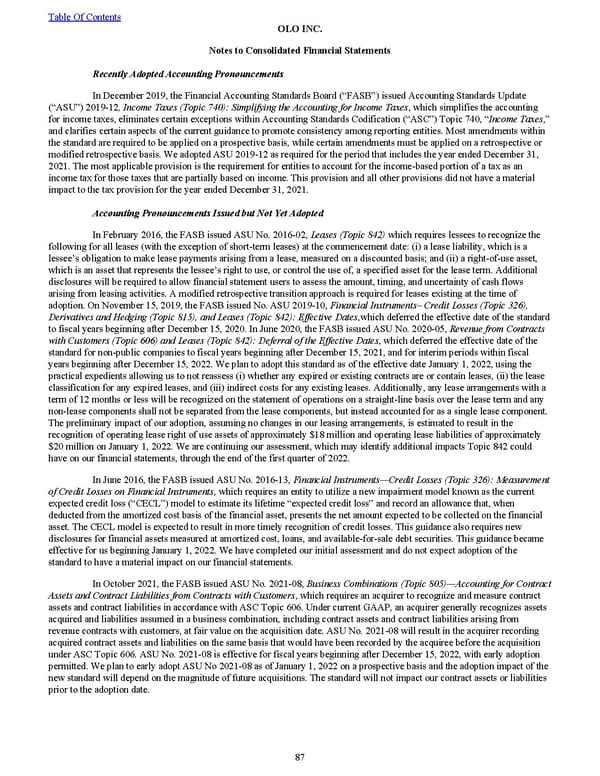Recently Adopted Accounting Pronouncements In December 2019, the Financial Accounting Standards Board (“FASB”) issued A ccounting Standards Update (“ASU”) 2019-12 , Income Taxes (Topic 740): Simplifying the Accounting for Income Taxes , which simplifies the accounting for income taxes, eliminates certain exceptions within A ccounting Standards Codification (“ASC”) Topic 740, “ Income Taxes ,” and clarifies certain aspects of the current guidance to promote consistency among reporting entities. Most amendments within the standard are required to be applied on a prospective basis, while certain amendments must be applied on a retrospective or modified retrospective basis. We adopted ASU 2019-12 as required for the period that includes the year ended December 31, 2021 . The most applicable provision is the requirement for entities to account for the income-based portion of a tax as an income tax for those taxes that are partially based on income. This provision and all other provisions did not have a material impact to the tax provision for the year ended December 31, 2021 . Accounting Pronouncements Issued but Not Yet Adopted In February 2016, the FASB issued ASU No. 2016-02, Leases (Topic 842) which requires lessees to recognize the following for all leases (with the exception of short-term leases) at the commencement date: (i) a lease liability, which is a lessee’s obligation to make lease payments arising from a lease, measured on a discounted basis; and (ii) a right-of-use asset, which is an asset that represents the lessee’s right to use, or control the use of, a specified asset for the lease term. Additional disclosures will be required to allow financial statement user s to assess the amount, timing, and uncertainty of cash flows arising from leasing activities. A modified retrospective transition approach is required for leases existing at the time of adoption. On November 15, 2019, the FASB issued No. ASU 2019-10, Financial Instruments– Credit Losses (Topic 326), Derivatives and Hedging (Topic 815), and Leases (Topic 842): Effective Dates , which deferred the effective date of the standard to fiscal years beginning after December 15, 2020. In June 2020, the FASB issued ASU No. 2020-05, Revenue from Contracts with Customers (Topic 606) and Leases (Topic 842): Deferral of the Effective Dates , which deferred the effective date of the standard for non-public companies to fiscal years beginning after December 15, 2021, and for interim periods within fiscal years beginning after December 15, 2022. We plan to adopt this standard as of the effective date January 1, 2022, using the practical expedients allowing us to not reassess (i) whether any expired or existing contracts are or contain leases, (ii) the lease classification for any expired leases, and (iii) indirect costs for any existing leases. Additionally, any lease arrangements with a term of 12 months or less will be recognized on the statement of operations on a straight-line basis over the lease term and any non-lease components shall not be separated from the lease components, but instead accounted for as a single lease component. The preliminary impact of our adoption, assuming no changes in our leasing arrangements, is estimated to result in the recognition of operating lease right of use assets of approximately $18 million and operating lease liabilities of approximately $20 million on January 1, 2022. We are continuing our assessment, which may identify additional impacts Topic 842 could have on our financial statements, through the end of the first quarter of 2022. In June 2016, the FASB issued ASU No. 2016-13, Financial Instruments—Credit Losses (Topic 326): Measurement of Credit Losses on Financial Instruments , which requires an entity to utilize a new impairment model known as the current expected credit loss (“CECL”) model to estimate its lifetime “expected credit loss” and record an allowance that, when deducted from the amortized cost basis of the financial asset, presents the net amount expected to be collected on the financial asset. The CECL model is expected to result in more timely recognition of credit losses. This guidance also requires new disclosures for financial assets measured at amortized cost, loans, and available-for-sale debt securities. This guidance became effective for us beginning January 1, 2022. We have completed our initial assessment and do not expect adoption of the standard to have a material impact on our financial statements. In October 2021, the FASB issued ASU No. 2021-08, Business Combinations (Topic 805)—Accounting for Contract Assets and Contract Liabilities from Contracts with Customers , which requires an acquirer to recognize and measure contract assets and contract liabilities in accordance with ASC Topic 606. Under current GAAP, an acquirer generally recognizes assets acquired and liabilities assumed in a business combination, including contract assets and contract liabilities arising from revenue contracts with customers, at fair value on the acquisition date. ASU No. 2021-08 will result in the acquirer recording acquired contract assets and liabilities on the same basis that would have been recorded by the acquiree before the acquisition under ASC Topic 606. ASU No. 2021-08 is effective for fiscal years beginning after December 15, 2022, with early adoption permitted. We plan to early adopt ASU No 2021-08 as of January 1, 2022 on a prospective basis and the adoption impact of the new standard will depend on the magnitude of future acquisitions. The standard will not impact our contract assets or liabilities prior to the adoption date. Table Of Contents OLO INC. Notes to Consolidated Financial Statements 87
 2022 10K Page 93 Page 95
2022 10K Page 93 Page 95